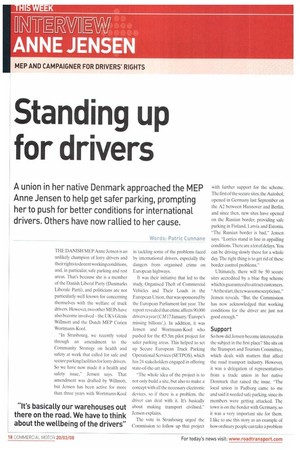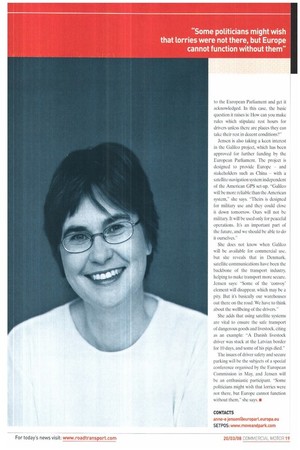Standing up for drivers
Page 18

Page 19

If you've noticed an error in this article please click here to report it so we can fix it.
A union in her native Denmark approached the MEP Anne Jensen to help get safer parking, prompting her to push for better conditions for international drivers. Others have now rallied to her cause.
Words: Patric Cunnane
THE DANISH MEP Anne Jensen is an unlikely champion of lorry drivers and theirrights to decent workingconditions, and, in particular, safe parking and rest areas. That's because she is a member of the Danish Liberal Party (Danmarks Liberale Parti), and politicians are not particularly well known for concerning themselves with the welfare of truck drivers. However, two other MEPs have also become involved the UK's Glenis Willmott and the Dutch MEP Corien Wortmann-Kool.
"In Strasbourg, we recently voted through an amendment to the Community Strategy on health and safety at work that called for safe and secure parking facilities for lorry drivers. So we have now made it a health and safety issue," Jensen says. That amendment was drafted by Willmott, but Jensen has been active for more than three years with Wortmann-Kool in tackling some of the problems faced by international drivers, especially the dangers from organised crime on European highways.
It was their initiative that led to the study Organised Theft of Commercial Vehicles and Their Loads in the European Union, that was sponsored by the European Parliament last year. The report revealed that crime affects 90,000 drivers a year (CM 17 January, 'Europe's missing billions',). In addition, it was Jensen and Wortmann-Kool who pushed for the €5.5m pilot project for safer parking areas. This helped to set up Secure European Truck Parking Operational Services (SETPOS). which has 24 stakeholders engaged in offering state-of-the-art sites.
"The whole idea of the project is to not only build a site, but also to make a concept with all the necessary electronic devices, so if there is a problem, the driver can deal with it. It's basically about making transport civilised," Jensen explains.
The vote in Strasbourg urged the Commission to follow up that project with further support for the scheme. The first of the secure sites, the Autohof, opened in Germany last September on the A2 between Hannover and Berlin, and since then, new sites have opened on the Russian border, providing safe parking in Finland, Latvia and Estonia. "The Russian border is bad," Jensen says. -Lorries stand in line in appalling conditions. There are a lot of delays. You can be driving slowly there for a whole day. The right thing is to get rid of these border control problems."
Ultimately, there will be 50 secure sites accredited by a blue flag scheme which is guaranteed to attract customers. "At the start, there was some scepticism," Jensen reveals. "But the Commission has now acknowledged that working conditions for the driver are just not good enough."
Support
So how did Jensen become interested in the subject in the first place? She sits on the Transport and Tourism Committee, which deals with matters that affect the road transport industry However, it was a delegation of representatives from a trade union in her native Denmark that raised the issue. "The local union in Padborg came to me and said it needed safe parking, since its members were getting attacked. The town is on the border with Germany, so it was a very important site for them. I like to use this story as an example of how ordinary people can take a problem to the European Parliament and get it acknowledged. In this case, the basic question it raises is: How can you make rules which stipulate rest hours for drivers unless there are places they can take their rest in decent conditions?" Jensen is also taking a keen interest in the Galileo project, which has been approved for further funding by the European Parliament. The project is designed to provide Europe — and stakeholders such as China — with a satellite-navigation system independent of the American GPS set-up. "Galileo will be more reliable than the American system," she says. "Theirs is designed for military use and they could close it down tomorrow. Ours will not be military. It will be used only for peaceful operations. It's an important part of the future, and we should be able to do it ourselves."
She does not know when Galileo will be available for commercial use, but she reveals that in Denmark. satellite communications have been the backbone of the transport industry, helping to make transport more secure. Jensen says: "Some of the 'convoy' element will disappear, which may be a pity. But it's basically our warehouses out there on the road. We have to think about the wellbeing of the drivers," She adds that using satellite systems are vital to ensure the safe transport of dangerous goods and livestock, citing as an example: "A Danish livestock driver was stuck at the Latvian border for 10 days, and some of his pigs died." The issues of driver safety and secure parking will be the subjects of a special conference organised by the European Commission in May, and Jensen will be an enthusiastic participant. "Some politicians might wish that lorries were not there, but Europe cannot function without them," she says. •
CONTACTS
anne-e jensenfaeuropart.europa.eu SETPOS: www.moveandpark.com








































































































































































